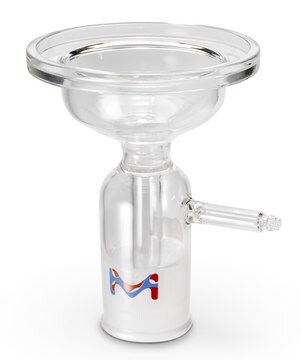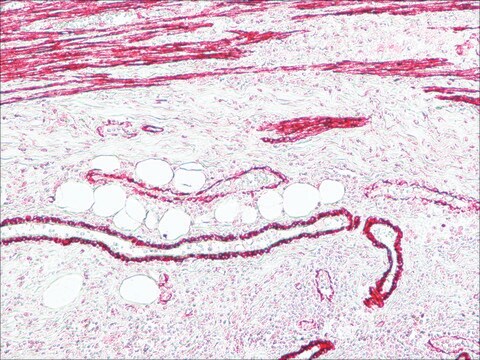Alle Fotos(1)
Wichtige Dokumente
96013
Abberior® STAR 635, Maleimid
for STED application
Anmeldenzur Ansicht organisationsspezifischer und vertraglich vereinbarter Preise
Alle Fotos(1)
About This Item
UNSPSC-Code:
12352200
NACRES:
NA.32
Empfohlene Produkte
Assay
≥80.0%
Form
solid
Löslichkeit
DMF: 0.25 mg/mL, clear
Fluoreszenz
λex 640 nm; λem 655 nm±10 nm in PBS, pH 7.4
Lagertemp.
−20°C
Allgemeine Beschreibung
Absorption Maximum, λmax: 635 nm (PBS, pH 7.4)
Extinction Coefficient, ε(λmax): 110,000 M-1cm-1 (PBS, pH 7.4)
Correction Factor, CF260 = ε260/εmax: 0.26 (PBS, pH 7.4)
Correction Factor, CF280 = ε280/εmax: 0.38 (PBS, pH 7.4)
Fluorescence Maximum, λfl: 656 nm (aq. acetonitrile; MeOH)
655 nm (PBS, pH 7.4)
Recommended STED Wavelength, λSTED: 750 −780 nm
Fluorescence Quantum Yield, η: 0.88 (PBS, pH 7.4)
Fluorescence Lifetime, τ: 2.8 (PBS, pH 7.4)
Extinction Coefficient, ε(λmax): 110,000 M-1cm-1 (PBS, pH 7.4)
Correction Factor, CF260 = ε260/εmax: 0.26 (PBS, pH 7.4)
Correction Factor, CF280 = ε280/εmax: 0.38 (PBS, pH 7.4)
Fluorescence Maximum, λfl: 656 nm (aq. acetonitrile; MeOH)
655 nm (PBS, pH 7.4)
Recommended STED Wavelength, λSTED: 750 −780 nm
Fluorescence Quantum Yield, η: 0.88 (PBS, pH 7.4)
Fluorescence Lifetime, τ: 2.8 (PBS, pH 7.4)
Anwendung
- Abberior® Star 635 maleimide has been used for single-molecule FRET (Förster resonance energy transfer) spectroscopy for protein dynamics in live cells.
- Abberior® STAR 635 goat anti-rabbit antibody has been used for STED (stimulated emission depletion) imaging of primary cultured striatal neurons obtained from rats.
- Abberior® STAR 635 anti-rabbit antibody has been used for STED imaging of non-sensory supporting cells obtained from cochlea of rats and mice.
- Abberior® STAR 635 conjugated with secondary antibody has been used for STED imaging of microtubules in cells.
Eignung
Designed and tested for fluorescent super-resolution microscopy
Sonstige Hinweise
Rechtliche Hinweise
abberior is a registered trademark of Abberior GmbH
Ähnliches Produkt
Produkt-Nr.
Beschreibung
Preisangaben
Lagerklassenschlüssel
13 - Non Combustible Solids
WGK
WGK 3
Flammpunkt (°F)
Not applicable
Flammpunkt (°C)
Not applicable
Hier finden Sie alle aktuellen Versionen:
Analysenzertifikate (COA)
Lot/Batch Number
Die passende Version wird nicht angezeigt?
Wenn Sie eine bestimmte Version benötigen, können Sie anhand der Lot- oder Chargennummer nach einem spezifischen Zertifikat suchen.
Besitzen Sie dieses Produkt bereits?
In der Dokumentenbibliothek finden Sie die Dokumentation zu den Produkten, die Sie kürzlich erworben haben.
Iwo König et al.
Nature methods, 12(8), 773-779 (2015-07-07)
Single-molecule methods have become widely used for quantifying the conformational heterogeneity and structural dynamics of biomolecules in vitro. Their application in vivo, however, has remained challenging owing to shortcomings in the design and reproducible delivery of labeled molecules, the range
Hans Blom et al.
PloS one, 8(9), e75155-e75155 (2013-09-24)
The phosphoprotein DARPP-32 (dopamine and cyclic adenosine 3´, 5´-monophosphate-regulated phosphoprotein, 32 kDa) is an important component in the molecular regulation of postsynaptic signaling in neostriatum. Despite the importance of this phosphoprotein, there is as yet little known about the nanoscale
Jenu Varghese Chacko et al.
Journal of biomedical optics, 19(10), 105003-105003 (2014-10-08)
Atomic force microscopes (AFM) provide topographical and mechanical information of the sample with very good axial resolution, but are limited in terms of chemical specificity and operation time-scale. An optical microscope coupled to an AFM can recognize and target an
Arnaud P Giese et al.
Development (Cambridge, England), 139(20), 3775-3785 (2012-09-20)
Vangl2 is one of the central proteins controlling the establishment of planar cell polarity in multiple tissues of different species. Previous studies suggest that the localization of the Vangl2 protein to specific intracellular microdomains is crucial for its function. However
S W Hell et al.
Optics letters, 19(11), 780-782 (1994-06-01)
We propose a new type of scanning fluorescence microscope capable of resolving 35 nm in the far field. We overcome the diffraction resolution limit by employing stimulated emission to inhibit the fluorescence process in the outer regions of the excitation
Unser Team von Wissenschaftlern verfügt über Erfahrung in allen Forschungsbereichen einschließlich Life Science, Materialwissenschaften, chemischer Synthese, Chromatographie, Analytik und vielen mehr..
Setzen Sie sich mit dem technischen Dienst in Verbindung.




